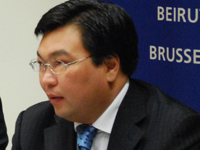Registration
Thank you!
You will receive an email confirming your registration.
IMGXYZ1359IMGZYXWith the war in Afghanistan drawing international attention, the Kyrgyz Republic and other Central Asian countries seem to have fallen off of the American agenda. During his diplomatic visit to the United States, Kyrgyz Foreign Minister Kadyrbek Sarbaev spoke at the Carnegie Endowment about the need to revamp Kyrgyz-US relations. In particular, he stressed that many of the problems plaguing Afghanistan and Kyrgyzstan are in fact regional problems, and that multilateral negotiations and mutual concessions can help find solutions to these problems.
Sarbaev identified several of the most important issues in the region and emphasized the role Kyrgyzstan can play in resolving them.
- Regional Security: Sarbaev explained what Kyrgyz President Bakiev called the Bishkek initiative. According to this plan, the establishment of a permanent platform in Bishkek for annual conferences, consultations, and expert meetings on regional security issues and for meetings of opposing sides for various conflicts could prove valuable for addressing security issues across the region, and particularly in Afghanistan. Sarbaev suggested that a center engaging in in-depth studies of Afghanistan, its culture and its foreign interests would send a positive signal to the Afghan people. This platform, and such studies, would enhance regional and international abilities to make informed decisions about security issues in Afghanistan.
- Drug Trafficking: Kyrgyzstan is one of the first stops in the chain of drug trafficking that stretches between Afghanistan and Russia, and into Europe. If more effort is put into counter-narcotic actions early in the transport process, and if more information is exchanged between various international and intergovernmental counter-narcotic agencies, shipments of drugs can be stopped long before they reach the buyers.
- Water and Energy Resources: The harsh winter of 2008, when all the Central Asian countries were faced with a water shortage, an energy shortage, or both, proved that clear and firm agreements between countries are necessary to avoid and resolve water and energy shortages. In spite of significant progress on this issue between Kyrgyzstan and Kazakhstan, cooperation in Central Asia has been sadly lacking. The reestablishment of multilateral negotiations, greater international involvement, concessions and compromises are imperative for finding a solution. “The forthcoming winter will not be easy for Kyrgyzstan,” said Sarbaev.
- The Environment: Ecological issues are a fundamental priority for the Kyrgyz Republic. Kyrgyzstan has 90 hazardous waste dumps holding 286 million tons of waste, including radionuclides and other toxic substances. The majority of these dumps do not meet international safety requirements. Furthermore, the climate change has been causing melting in the Republic’s glaciers, threatening water supplies, agriculture and food security for the country and the region as a whole. The Kyrgyz Republic has joined the International Fund for Saving the Aral Sea and the UN Ecological Conventions, and calls for international attention and involvement in these and similar environmental issues.
Conflicts and instability in Afghanistan and the deteriorating situation in Pakistan undermine stability in Central Asia and pose threats far beyond the region. Foreign Minister Sarbaev emphasized that, “as a sovereign and peaceful state with constant interest in settlement of potential civil and military conflicts in the region, Kyrgyzstan is always ready to make adequate contribution to common efforts aimed at supporting regional stability and peace.”
Political ReformDemocracyEconomyClimate ChangeSecuritySouth AsiaAfghanistanPakistanCentral AsiaKazakhstanKyrgyz RepublicTajikistanTurkmenistanUzbekistan
